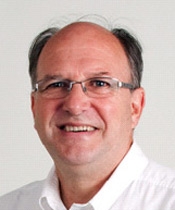
Date:
Location:
Speaker:
ABSTRACT:
I will provide a (very) brief (and personal) view of the history of process control. The focus was placed on distributed, single loop controllers for stabilization of process networks through the 1970ies. The development of the optimization based model predictive control then garnered attention and from the 1980ies it became a mainstay of process control research. MPC is now standard in most APC applications. But, industry struggles with implementing and maintaining these systems. The single loop control systems of the 1950ies still account for the bulk of process control applications. Why is this so? Chemical manufacturing now move towards “digitalization”. The 4th industrial revolution (Industry 4.0, the first industrial revolution to be announced before its implementation), includes ideas that relate to cloud computing, storage and analysis of massive amounts of diverse data, machine learning and diverse software tools to be integrated over the web. Meanwhile, the same problem persists: How do we integrate physics, computation and communication in real time. Are there differences among controlling a rocket, playing a computer game or Go using re-enforcement learning, or optimizing a chemical plant? If so, how do we take these differences into account when we design the control system?
BIO:
B. Erik Ydstie holds BS and MS degree in Chemistry from NTNU (1977) and a PhD in Chemical Engineering from Imperial College (1982). From 1982 to 1992 he taught in the Department of Chemical Engineering at the University of Massachusetts. From 1992 he has been a professor at Carnegie Mellon. From 1999 to 2000 he was Director of R&D with ELKEM ASA where he restructured the R&D organization and initiated R&D programs aimed towards developing new processes for making aluminum and high purity silicon for solar cells. He was Professor II of Material Science and Electrical Engineering at NTNU from 2001 till 2015. In 2005 he founded iLS Inc., to commercializes nonlinear control systems using machine learning technology. He has served on the advisory boards of the American Chemical Society, Petroleum Research Fund and the Worcester Polytechnic Institute. He has held visiting positions at Imperial College, Ecoles des Mines, Paris, UNSW in Australia, and UCL at Louvain la Neuve in Belgium. His current areas of research are process control and machine learning, irreversible thermodynamics, process modeling, crystallization, global aerosol modeling, and solar cells.



